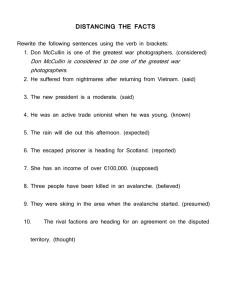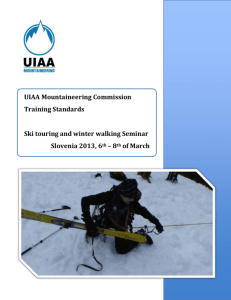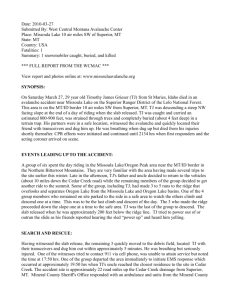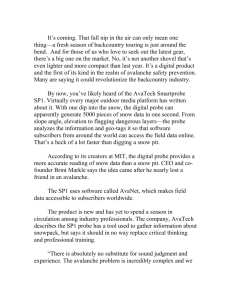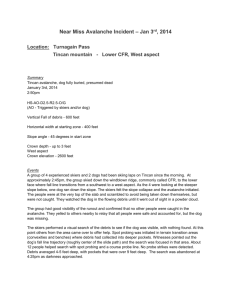CAA and IKAR ARC Field Session in Revelstoke_e
advertisement
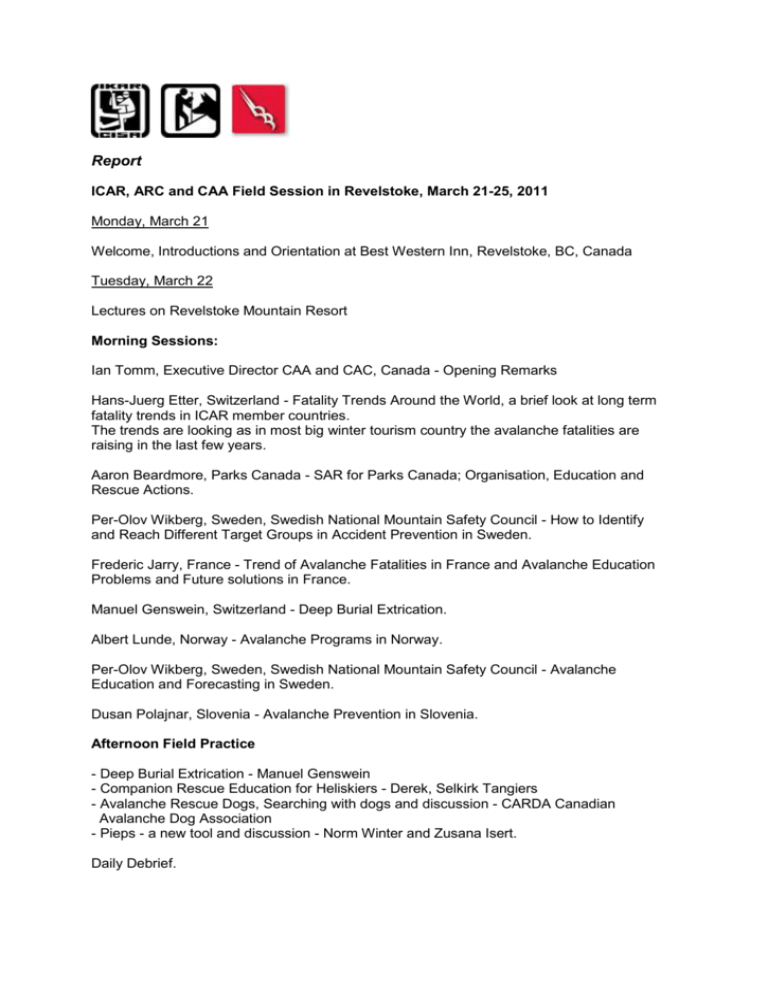
Report ICAR, ARC and CAA Field Session in Revelstoke, March 21-25, 2011 Monday, March 21 Welcome, Introductions and Orientation at Best Western Inn, Revelstoke, BC, Canada Tuesday, March 22 Lectures on Revelstoke Mountain Resort Morning Sessions: Ian Tomm, Executive Director CAA and CAC, Canada - Opening Remarks Hans-Juerg Etter, Switzerland - Fatality Trends Around the World, a brief look at long term fatality trends in ICAR member countries. The trends are looking as in most big winter tourism country the avalanche fatalities are raising in the last few years. Aaron Beardmore, Parks Canada - SAR for Parks Canada; Organisation, Education and Rescue Actions. Per-Olov Wikberg, Sweden, Swedish National Mountain Safety Council - How to Identify and Reach Different Target Groups in Accident Prevention in Sweden. Frederic Jarry, France - Trend of Avalanche Fatalities in France and Avalanche Education Problems and Future solutions in France. Manuel Genswein, Switzerland - Deep Burial Extrication. Albert Lunde, Norway - Avalanche Programs in Norway. Per-Olov Wikberg, Sweden, Swedish National Mountain Safety Council - Avalanche Education and Forecasting in Sweden. Dusan Polajnar, Slovenia - Avalanche Prevention in Slovenia. Afternoon Field Practice - Deep Burial Extrication - Manuel Genswein - Companion Rescue Education for Heliskiers - Derek, Selkirk Tangiers - Avalanche Rescue Dogs, Searching with dogs and discussion - CARDA Canadian Avalanche Dog Association - Pieps - a new tool and discussion - Norm Winter and Zusana Isert. Daily Debrief. Evening Sessions: Ian Tomm - Search and Rescue Services in BC Buck Corrigan, Revelstoke, BC, Chief of the Revelstoke Search & Rescue Team - SAR around Revelstoke - Meeting with the SAR team Tour of CAA/CAC Offices Cam Campbell, CAC - Presentation on Avalanche Forecasting in Canada. March 23 and 24 One day: Helicopter-Assisted Ski Touring, Guides Meeting/Briefing with the topics: - Weather, weather forecast - Avalanche observation - Stability degree (1 - 5) - Opinion of the attending guides - Summary of the avalanche danger - Evaluation of each run (green: good; yellow: uncertain; red: closed; black closed for an indefinite time. Field Activity: Presented by Applied Snow and Avalanche Research (ASARC) with University of Calgary. Snow profiles and Stability Tests used in Canada A Review of Professional and Recreational approaches One day: Snowmobile, riding lesson and avalanche education for Snowmobilers, Snowmobile practice, travel to Boulder Hut and Turbo Hill area where the largest snow mobile avalanche accident happened in March 2010 (more than 60 snowmobilers involved and 2 snowmobilers were killed). Explanation and discussion about. Indoor: - Safety talk, Avalanche Danger Prevention and Education for Snowmobilers. - Phil Hein, President of the CAA Board - Education levels in Canada (3); modular composition for professionals. Included below is a brief description of each of the Canadian Avalanche Operations courses; level 1 through 3. Avalanche Operations Level 1 This course is the first professional level training course for persons who are seeking employment with avalanche risk management operations. Participants must be advanced skiers or splitboarders and should have considerable backcountry travel experience commensurate with industry standards. The Level 1 course is an essential prerequisite course to many other industry-training programs including guiding. This intensive 7 to 8 day technical training course is comprised of approximately 40% theory & classroom work and 60% practical application & field work. See Sample Course Schedule under "Related Links" for an example of an average day. Program Goals State the formation & nature of avalanches & the hazards involved Apply personal & group safety measures & perform companion rescue Recognize avalanche terrain Participate in organized search & rescue Describe significant properties of the mountain snowpack Collect & record weather, snowpack and avalanche occurrence data State the factors that are applied in snow stability evaluation State elements of operational risk management and decision making Avalanche Operations Level 2 The Level 2 Program is divided into three modules. Module 1 focuses on decision making, advanced snow science concepts and operational risk management principles in a four-day, theory-based classroom environment. Modules 2 and 3 are field-based programs that involve the application of Module 1 principles into real-life operational decision making and risk management. Module 2 is a three and ½-day field course in an evaluation-free setting. Module 3 is a seven-day course where students’ skills and competency in both technical knowledge and practical application of Level 2 concepts is evaluated. Successful completion of Module 3 results in a Level 2 certification by the CAA. Program Goals collect & evaluate detailed weather, snowpack & avalanche data travel safely in avalanche terrain evaluate & forecast snow stability for different geographic areas manage personal wellness & performance evaluate terrain & its interaction with the mountain snowpack develop & apply effective communication and teamwork skills evaluate & forecast avalanche hazard develop concepts of risk management for the workplace Avalanche Operations Level 3 This 5-day classroom-based course is a requirement for CAA qualifications for both Avalanche Forecasters and Avalanche Planners Program Goals The principles of avalanche hazard and risk Avalanche hazard evidence and data stream Heuristics and bias in avalanche hazard forecasting Avalanche risk assessment, management and control The role of uncertainty and confidence in forecasting Communicating avalanche hazard and risk The avalanche hazard analysis, assessment & forecasting process ____________________________ Conference Wrap-up; Meet the Sponsors. Conclusion: It was an interesting event and everybody could learn a lot. It is a starter for the ICAR ARC to invest more time in avalanche prevention and education. We should continue in a part of the Field Practice Day from ICAR ARC in Are next fall. The topic will be: Prevention and Education for professionals and recreationals in the different countries (including a diagram structure) All of the presentations are available through the following link: https://avalanche.box.net/shared/7clsgdda0v Thanks to - the CAA staff for organizing this event. They did a perfect job in organizing and accomplishment. - all volunteers for their big help - the sponsors who helped make this CAA and ICAR ARC Field Session possible. Special thanks go to - Ian Tomm, Executive Director CAA and CAC Kristin Anthony-Malone, Operations Manager CAA Audrey Defant, Client Services CAA for their perfect, great and excellent work. Hans-Juerg Etter ICAR, Chairman Avalanche Rescue Commission (ARC) Davos, April, 2011 Participants Beardmore Aaron Cardinale Dean Dietrich Beat Dietrich Jolande Eriksson Anders Etter Hans-Juerg Genswein Manuel Hein Phil Jarry Frederic, Kjellstroem Alf, Lindberg Staffan, Lunde Albert, Mark Bill Nilsson Matts Nord Leif Oshiro Kazue Polajnar Dusan Volontar Klemen Wikberg Per-Olov Canada USA Switzerland Switzerland Sweden Switzerland Switzerland Canada France Sweden Sweden Norway Canada Sweden Sweden Japan Slovenia Slovenia Sweden and many part time attendee. Links to videos: Day one http://www.wbrescue.org/blog/ari-theodore/2011-ikar-conference-spring-field-sessionrevelstoke-bc Day two http://www.youtube.com/watch?v=9S7q_wzfefU&feature=email Day three http://www.youtube.com/watch?v=22JqG2E-3DI&feature=email Thanks to Dean Cardinale for the videos. Links to photos: http://www.wikbergs.com/IKAR_Revelstoke_day1 http://www.wikbergs.com/IKAR_Revelstoke_day2_snowmobile/ http://www.wikbergs.com/IKAR_revelstoke_day3_heliskiing http://www.wikbergs.com/ParcsKanada_Banff/ Thanks to Per-Olov Wikberg
